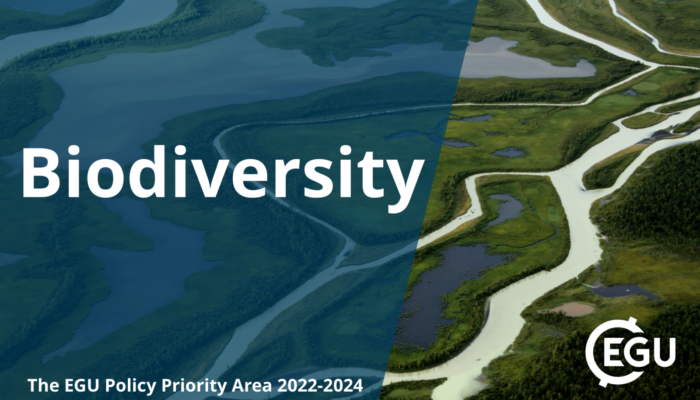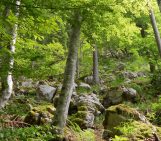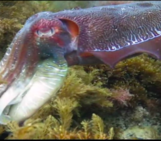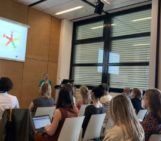
This week EGU announced the launch of an open call for members of a new Biodiversity Task Force to help EGU interact with European policymakers through it’s official Policy Priority Area ‘Biodiversity’. But what is a policy Task Force? What kind of work is involved? And are you eligible to apply to be a member? We sat down with EGU Policy Manager Chloe Hill to talk about the recent launch of the Policy Priority Area, the Biodiversity Task Force, and what comes next.
Why do we need an EGU Task Force for the Biodiversity Policy Priority Area?
As Europe’s largest geoscience society with 20,000 scientific members, the EGU is uniquely positioned to provide scientific information to policymakers and facilitate science-policy connections in a wide range of different policy areas. However, this vast range of expertise also makes it difficult for the EGU to focus on any one topic with enough detail to provide specific input and recommendations to policymakers working in those areas. Creating a Policy Priority Area allows the EGU to concentrate on an individual topic in more detail and therefore meaningfully contribute to EU policies and initiatives!
Biodiversity was ultimately selected as the EGU’s Policy Priority Area due to its applicability to many EGU Divisions, as well as its relevance to many current and future policies (which you can read more about in the EU’s Biodiversity Strategy for 2030)! To provide scientific information and generate meaningful policy impact, we of course need the help of experts and that’s where our members come in. The Biodiversity Task Force will be made up of 8-10 experts who will work on activities that support the transfer of biodiversity-related knowledge to policymakers and promote evidence-informed policy.
What will be the main role of a Task Force member?
Great question! There are A LOT of different activities that the Biodiversity Task Force will engage with because biodiversity is an incredibly broad theme. But ultimately, the thematic focus of the Task Force and the activities undertaken will be decided on by its members. That decision will take into account upcoming EU policies and legislation, the needs of policymakers, and the expertise of individual members within the group. It’s important that individual Task Force members remain flexible and understand that the group won’t always be able to focus on their exact area of expertise or research.
Some activities that the Task Force may consider include:
- answering European Commission Consultations in collaboration with the EGU Executive Board;
- joining a relevant European Commission Expert Group;
- participating in and speaking at biodiversity-relevant policy events; and
- highlighting specific areas that require scientific input to the EGU community through the publication of a short document or factsheet.
The EGU’s Science for Policy Working Group will also provide the Task Force members with guidance about the types of activities that are most relevant and useful.
What kind of time-commitment are you expecting? Will I have to travel?
We ask that applicants be able to commit to at least 4 hours per month as we believe this is the amount of time needed for the group to be able to create impact or establish a new initiative. We understand that scientists already have a limited amount of time, but we hope those who apply will see the potential policy impact of the Task Force as worthwhile! All of the Task Force meetings will take place online, as will the vast majority of the group’s work and communication. However, once COVID-19 restrictions ease, there may be opportunities for some or all of the Task Force members to travel to Brussels to participate in a biodiversity-related initiative. For example, if the Task Force successfully joins an European Commission Expert Group, they may be invited to Brussels to meet and discuss with other stakeholders in this group. The EGU is also hoping to host its annual science for policy event in Brussels in 2022 that will focus on biodiversity. It would be great to have some, or all, of the Task Force members participate in this!
Who can apply to be on the EGU Biodiversity Task Force? Do you have to be a certain career stage?
EGU would like to see a Task Force made up of members representing a diverse range of scientific backgrounds and career stages! The task force will of course need some more experienced members, but we believe that it’s also important to include the voices of early career scientists. While the primary aim of the Task Force is to support EGU’s policy activities, we also hope that it will give the EGU members involved the opportunity to gain experience working at the science-policy interface, gain new insights, and expand their network.
The composition of the Task Force will of course depend on who applies so I’d really encourage you to submit your application if it is something that you think you’d like to be involved with!
I’ve never worked in with policy before – can I still apply?
Absolutely! As I mentioned in the previous question, we will need some more experienced Task Force members, but this will also be a great learning opportunity for EGU members who don’t yet have experience in policy, but who would really like to learn – and who also have the time to do so!
Do I have to work in biodiversity research to apply? What other areas of research will be relevant?
Yes – we’d like the members of the Task Force to have some expertise in the area of biodiversity. However, biodiversity is an extremely broad topic and covers more EGU Divisions and research topics than you might realise. Biodiversity is not only vital for natural areas such as forests and wetlands, but also essential for the health of the cryosphere, freshwater ecosystems, soil systems, and our oceans! Geomorphology and changes in landscapes because of processes like climate change can also impact biodiversity. You can read more biodiversity-related geoscience areas, along with specific examples, in the EGU’s 2020 publication ‘How geoscience can support the European Green Deal’.
Ideally, all of the members in the Task Force will have a different area of expertise and to be able to work together. As a member of the Task Force, you will need to be able to zoom out and think about the bigger picture and have flexibility in the topic focused on. Connecting the dots between science and policy, instead of focusing on the details of your own research, is an important part of science for policy, and a skill that can be developed over time. The EGU’s Science for Policy Working Group will also be able to provide the Task Force with some guidance in this area and provide the group with a direction that everyone can jointly work towards.
Thank you Chloe for speaking with us about the new Policy Priority Area and Biodiversity Task Force!
You can read more about the Task Force here and how you can apply to join here! All applications should be submitted by 17 December 2021. If you have any further questions about biodiversity, the EGU’s Policy Priority Area or about joining the Biodiversity Task Force, please don’t hesitate to get in touch via policy@egu.eu.




